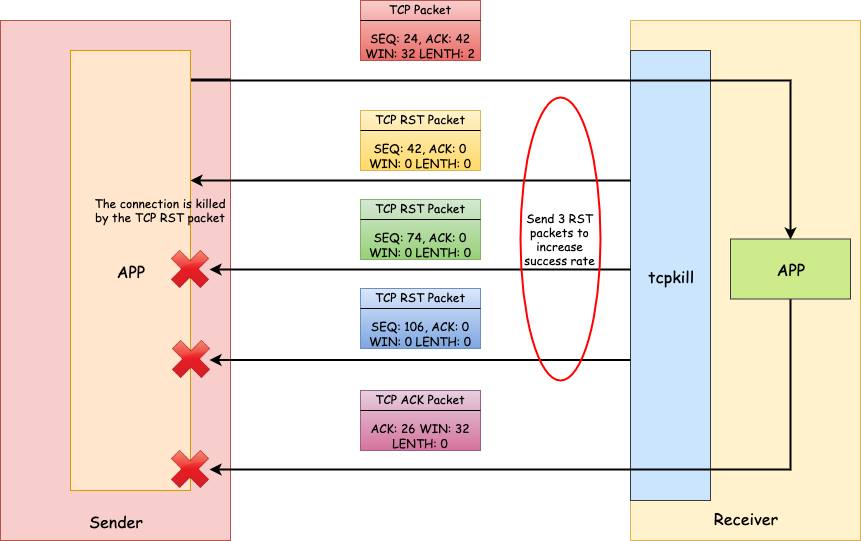Tcpkill
tcpkill is part of dsniff, a collection of tools for network auditing and penetration testing. It can be used to kill specified in-progress TCP connections.
How does it work?
The way tcpkill works is essentially a TCP reset attack. It leverages two libraries – libpcap, a system-independent interface for user-level packet capture, and libnet, an API to help with the construction and injection of network packets.
tcpkill uses libpcap to capture packets on an interface and then for each
received TCP packet, send a TCP packet with RST flag back to the sender using
libnet to reset the TCP connection. Because it can get the SEQ and ACK
number in the received TCP headers, it does much better than a blind reset
attack. As we know, the next
SEQ sending to peer should be the last ACK received from the peer.
However, this is still a guess because if the RST packet injected by libnet
comes after the real reply, then the RST packet’s SEQ number will be outside
the receive window and be discarded. To increase the success rate of the
attack, tcpkill has an option to specify how many RST packets to send (3 by
default) for each received packet. And the interval of the SEQ numbers
between two consecutive RST packets is the window size.

IPv6 Support
Because of the age of the tool (19 years old!), it doesn’t support IPv6. tcpkill will print an error message and exit if it doesn’t detect any IPv4 address on the interface. But fortunately, its two dependencies – libpcap and libnet – both support IPv6. So we only need to adapt the original code and make it support IPv6. See the adapted code on Github.
Test
First, let’s start an iperf connection between a server and a client. Then, we start tcpkill on the server host with capture filter to be “port 5201”
$ make tcpkill6 && sudo ./tcpkill6 -i eth0 port 5201
On the client side, we will see something like:
$ iperf3 -c <server IPv6>
Connecting to host <server IPv6>, port 5201
[ 4] local <client IPv6> port 44204 connected to <server IPv6> port 5201
[ ID] Interval Transfer Bandwidth Retr Cwnd
[ 4] 0.00-1.00 sec 736 KBytes 6.03 Mbits/sec 0 178 KBytes
[ 4] 1.00-2.00 sec 25.8 MBytes 216 Mbits/sec 0 8.78 MBytes
[ 4] 2.00-3.00 sec 97.5 MBytes 818 Mbits/sec 0 32.2 MBytes
[ 4] 3.00-4.00 sec 96.2 MBytes 807 Mbits/sec 0 32.2 MBytes
iperf3: error - unable to write to stream socket: Connection reset by peer
Similarly, on the server side:
$ iperf3 -s
-----------------------------------------------------------
Server listening on 5201
-----------------------------------------------------------
Accepted connection from <client IPv6>, port 44202
[ 5] local <server IPv6> port 5201 connected to <client IPv6> port 44204
[ ID] Interval Transfer Bandwidth
[ 5] 0.00-1.00 sec 165 KBytes 1.35 Mbits/sec
[ 5] 1.00-2.00 sec 8.61 MBytes 72.2 Mbits/sec
[ 5] 2.00-3.00 sec 72.7 MBytes 610 Mbits/sec
[ 5] 3.00-4.00 sec 95.7 MBytes 803 Mbits/sec
iperf3: error - unable to read from stream socket: Connection reset by peer
-----------------------------------------------------------
Server listening on 5201
-----------------------------------------------------------
